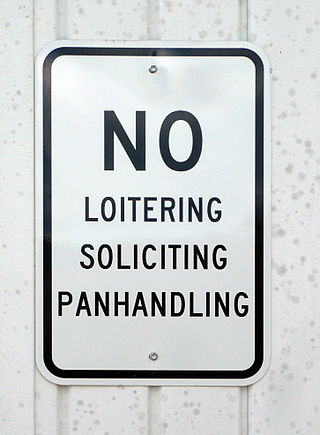A misdemeanor is any "lesser" criminal act in some common law legal systems. Misdemeanors are generally punished less severely than more serious felonies, but theoretically more so than administrative infractions and regulatory offences. Typically, misdemeanors are punished with monetary fines or community service.
Life imprisonment is any sentence of imprisonment for a crime under which convicted criminals are to remain in prison for the rest of their lives or indefinitely until pardoned, paroled, or commuted to a fixed term. Crimes that warrant life imprisonment are usually violent and/or dangerous. Examples of crimes that result in life sentences are murder, torture, terrorism, child abuse resulting in death, rape, espionage, treason, drug trafficking, drug possession, human trafficking, severe fraud and financial crimes, aggravated criminal damage, arson, and Hate Crime, kidnapping, burglary, and robbery, piracy, aircraft hijacking, and genocide, crimes against humanity, war crimes, severe cases of child pornography, or any three felonies in the case of a three-strikes law.
An ex post facto law is a law that retroactively changes the legal consequences of actions that were committed, or relationships that existed, before the enactment of the law. In criminal law, it may criminalize actions that were legal when committed; it may aggravate a crime by bringing it into a more severe category than it was in when it was committed; it may change the punishment prescribed for a crime, as by adding new penalties or extending sentences; it may extend the statute of limitations; or it may alter the rules of evidence in order to make conviction for a crime likelier than it would have been when the deed was committed.
Adverse possession, sometimes colloquially described as "squatter's rights", is a legal principle in the Anglo-American common law under which a person who does not have legal title to a piece of property—usually land —may acquire legal ownership based on continuous possession or occupation of the property without the permission (licence) of its legal owner.
The Legal Services Commission (LSC) was an executive non-departmental public body of the Ministry of Justice which was responsible for the operational administration of legal aid in England and Wales between 2000 and 2013.
The standard scale is a system in Commonwealth law whereby financial criminal penalties (fines) in legislation have maximum levels set against a standard scale. Then, when inflation makes it necessary to increase the levels of the fines the legislators need to modify only the scale rather than every individual piece of legislation.

The Rehabilitation of Offenders Act 1974 (c.53) of the UK Parliament enables some criminal convictions to be ignored after a rehabilitation period. Its purpose is that people do not have a lifelong blot on their records because of a relatively minor offence in their past. The rehabilitation period is automatically determined by the sentence. After this period, if there has been no further conviction the conviction is "spent" and, with certain exceptions, need not be disclosed by the ex-offender in any context such as when applying for a job, obtaining insurance, or in civil proceedings. A conviction for the purposes of the ROA includes a conviction issued outside Great Britain and therefore foreign convictions are eligible to receive the protection of the ROA.

Loitering is the act of standing or waiting around idly without purpose in some public places.
Although the legal system of Singapore is a common law system, the criminal law of Singapore is largely statutory in nature and historically derives largely from the Indian penal code. The general principles of criminal law, as well as the elements and penalties of general criminal offences such as assault, criminal intimidation, mischief, grievous hurt, theft, extortion, sex crimes and cheating, are set out in the Singaporean Penal Code. Other serious offences are created by statutes such as the Arms Offences Act, Kidnapping Act, Misuse of Drugs Act and Vandalism Act.

The Criminal Law Act 1977 is an Act of the Parliament of the United Kingdom. Most of it only applies to England and Wales. It creates the offence of conspiracy in English law. It also created offences concerned with criminal trespass in premises, made changes to sentencing, and created an offence of falsely reporting the existence of a bomb.
The Advisory Service for Squatters (A.S.S.) is a non-profit group based in London and run by volunteers. It aims to provide practical advice and legal support for squatters. It was founded in 1975, having grown out of the Family Squatters Advisory Service. After being based for many years in St. Paul's Road in Islington, A.S.S. moved its offices to Whitechapel High Street, in the same building as Freedom Press.
Laws against child sexual abuse vary by country based on the local definition of who a child is and what constitutes child sexual abuse. Most countries in the world employ some form of age of consent, with sexual contact with an underage person being criminally penalized. As the age of consent to sexual behaviour varies from country to country, so too do definitions of child sexual abuse. An adult's sexual intercourse with a minor below the legal age of consent may sometimes be referred to as statutory rape, based on the principle that any apparent consent by a minor could not be considered legal consent.

Crime in New Zealand encompasses criminal law, crime statistics, the nature and characteristics of crime, sentencing, punishment, and public perceptions of crime. New Zealand criminal law has its origins in English criminal law, which was codified into statute by the New Zealand parliament in 1893. Although New Zealand remains a common law jurisdiction, all criminal offences and their penalties are codified in New Zealand statutes.

Michael Richard Weatherley was a British Conservative Party politician who was the Member of Parliament (MP) for Hove in East Sussex from 2010 to 2015.
Aiding and abetting is a legal doctrine related to the guilt of someone who aids or abets another person in the commission of a crime. It exists in a number of different countries and generally allows a court to pronounce someone guilty for aiding and abetting in a crime even if he or she is not the principal offender. The words aiding, abetting and accessory are closely used but have differences. While aiding means providing support or assistance to someone, abetting means encouraging someone else to commit a crime. Accessory is someone who in fact assists "commission of a crime committed primarily by someone else".

In England and Wales, squatting—taking possession of land or an empty house the squatter does not own—occurs for a variety of reasons which include needing a home, protest, poverty, and recreation. Many squats are residential; some are also opened as social centres. Land may be occupied by New Age travellers or treesitters.

Czech law, often referred to as the legal order of the Czech Republic, is the system of legal rules in force in the Czech Republic, and in the international community it is a member of. Czech legal system belongs to the Germanic branch of continental legal culture. Major areas of public and private law are divided into branches, among them civil, criminal, administrative, procedural and labour law, and systematically codified.

The Legal Aid Agency is an executive agency of the Ministry of Justice (MoJ) in the United Kingdom. It provides both civil and criminal legal aid and advice in England and Wales. The agency was formed on 1 April 2013 as a replacement for the Legal Services Commission, which unlike the Legal Aid Agency, was a non-departmental public body of the MoJ. This change was enacted by the Legal Aid, Sentencing and Punishment of Offenders Act 2012 to allow for greater ministerial control over the UK government's legal aid budget.

The Criminal Justice and Courts Act 2015 is an Act of the Parliament of the United Kingdom which made a number of changes to the criminal justice system. It was introduced to the House of Commons on 5 February 2014 by Lord Chancellor Chris Grayling and received Royal Assent on 12 February 2015.
Squatters' Action for Secure Homes (SQUASH) is an activist group formed first in the 1990s in the United Kingdom to represent the interests of squatters and to fight the proposed criminalisation of squatting. It then reformed in 2011, when there were again parliamentary discussions about making squatting illegal. After squatting was (partially) criminalised in 2012, the group continues to monitor arrests and convictions.









